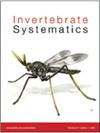Corrigendum to: Cryptic diversity down under: defining species in the subterranean amphipod genus Nedsia Barnard & Williams, 1995 (Hadzioidea: Eriopisidae) from the Pilbara, Western Australia
IF 1.8
2区 生物学
Q3 EVOLUTIONARY BIOLOGY
引用次数: 0
Abstract
Amphipod crustaceans comprise a significant and enigmatic component of Australian groundwater ecosystems, particularly in the Pilbara region of Western Australia. Many amphipod species in the Pilbara, including species in the genus Nedsia Barnard & Williams, 1995, are considered short range endemics, poorly or contentiously defined by taxonomic treatments based on morphology alone and have uncertain distributions as a consequence of this taxonomy. A modern systematic revision of Nedsia is presented here, utilising both molecular and morphological analyses alongside distributional data to delineate species. We describe 13 new species of Nedsia, confirm three existing species and synonymise eight previously described species. Nedsia species are confirmed to be functionally morphologically cryptic, with COI divergences at the 5–20% level. We present comparatively reduced taxonomic descriptions for these cryptic amphipod species in an effort to provide an accelerated pathway for future taxonomic work. The research provides the basis for future environmental impact assessments involving Nedsia species and ongoing monitoring of the groundwater communities these form part of in the resource-rich Pilbara region.更正:地下的隐蔽多样性:来自西澳大利亚皮尔巴拉的地下两栖足类Nedsia Barnard&Williams的定义物种,1995年(Hadzioidea:Eriopisidae)
两栖类甲壳类动物是澳大利亚地下水生态系统中一个重要而神秘的组成部分,尤其是在西澳大利亚的皮尔巴拉地区。皮尔巴拉的许多片脚类物种,包括Nedsia Barnard&Williams属的物种,1995年,被认为是短期特有种,仅基于形态学的分类处理难以或有争议地定义,并且由于该分类法而具有不确定的分布。本文对Nedsia进行了现代系统的修订,利用分子和形态学分析以及分布数据来描述物种。我们描述了Nedsia的13个新种,确认了现有的3个物种,并对之前描述的8个物种进行了同义。Nedsia物种被证实在功能形态上是隐蔽的,COI差异在5-20%的水平上。我们对这些隐蔽的两足类物种进行了相对较少的分类学描述,以期为未来的分类学工作提供一条加速的途径。这项研究为未来涉及Nedsia物种的环境影响评估和对地下水群落的持续监测提供了基础,地下水群落是资源丰富的皮尔巴拉地区的一部分。
本文章由计算机程序翻译,如有差异,请以英文原文为准。
求助全文
约1分钟内获得全文
求助全文
来源期刊

Invertebrate Systematics
生物-动物学
CiteScore
4.30
自引率
9.10%
发文量
35
审稿时长
>12 weeks
期刊介绍:
Invertebrate Systematics (formerly known as Invertebrate Taxonomy) is an international journal publishing original and significant contributions on the systematics, phylogeny and biogeography of all invertebrate taxa. Articles in the journal provide comprehensive treatments of clearly defined taxonomic groups, often emphasising their biodiversity patterns and/or biological aspects. The journal also includes contributions on the systematics of selected species that are of particular conservation, economic, medical or veterinary importance.
Invertebrate Systematics is a vital resource globally for scientists, students, conservation biologists, environmental consultants and government policy advisors who are interested in terrestrial, freshwater and marine systems.
Invertebrate Systematics is published with the endorsement of the Commonwealth Scientific and Industrial Research Organisation (CSIRO) and the Australian Academy of Science.
 求助内容:
求助内容: 应助结果提醒方式:
应助结果提醒方式:


